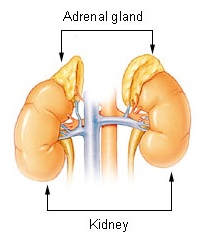Adrenal insufficiency
(Redirected from Adrenal suppression)
| Adrenal insufficiency | |
|---|---|

| |
| Synonyms | Hypoadrenalism, hypocorticism |
| Pronounce | N/A |
| Specialty | N/A |
| Symptoms | Fatigue, muscle weakness, weight loss, nausea, vomiting, hypotension |
| Complications | Adrenal crisis, shock, coma |
| Onset | Can be acute or chronic |
| Duration | Long-term |
| Types | N/A |
| Causes | Autoimmune disease, infection, hemorrhage, genetic disorder |
| Risks | Autoimmune polyendocrine syndrome, tuberculosis, HIV/AIDS |
| Diagnosis | Blood test, ACTH stimulation test, imaging |
| Differential diagnosis | Hypothyroidism, anemia, depression |
| Prevention | N/A |
| Treatment | Hormone replacement therapy, glucocorticoids, mineralocorticoids |
| Medication | Hydrocortisone, fludrocortisone |
| Prognosis | N/A |
| Frequency | Rare |
| Deaths | Can be fatal if untreated |
Adrenal insufficiency is a condition where the adrenal glands produce insufficient amounts of certain hormones, particularly cortisol and, in some cases, aldosterone. It can be categorized as primary, secondary, or tertiary based on the level of dysfunction in the hypothalamic-pituitary-adrenal axis.
Causes[edit | edit source]
- Primary adrenal insufficiency, also known as Addison's disease, occurs when the adrenal glands themselves are damaged or impaired. Causes may include autoimmune disorders, infections, and rare genetic disorders.
- Secondary and tertiary adrenal insufficiency occur due to insufficient production of adrenocorticotropic hormone (ACTH) by the pituitary gland or corticotropin-releasing hormone (CRH) by the hypothalamus, respectively. Causes may include long-term corticosteroid use, tumors, or pituitary surgery.
Clinical Presentation[edit | edit source]
- Symptoms of adrenal insufficiency may include:
- Fatigue
- Weight loss
- Muscle weakness
- Low blood pressure
- Darkening of the skin (in primary adrenal insufficiency)
- Salt cravings
- An adrenal crisis, a severe form of adrenal insufficiency, is a medical emergency that can cause severe abdominal pain, vomiting, confusion, and loss of consciousness.
Diagnosis[edit | edit source]
- The diagnosis of adrenal insufficiency involves a combination of clinical examination, medical history, and laboratory tests. Laboratory tests may include:
- Serum cortisol and ACTH levels
- ACTH stimulation test
- Imaging studies such as CT scan or MRI to evaluate the adrenal or pituitary glands
Treatment[edit | edit source]
- Adrenal insufficiency is typically treated with hormone replacement therapy to replace insufficient hormones. This usually involves oral corticosteroids such as hydrocortisone or prednisone, and in some cases, a mineralocorticoid like fludrocortisone. Regular follow-up and dosage adjustments are often needed.
- During periods of stress or illness, or in case of an adrenal crisis, increased dosages or injectable corticosteroids may be required.
Prognosis[edit | edit source]
With proper treatment, individuals with adrenal insufficiency can lead normal, healthy lives. However, they should always carry medical alert identification and be educated about how to increase medication during periods of stress or illness to prevent adrenal crisis.
See Also[edit | edit source]
References[edit | edit source]
- Mayo Clinic. (2023). Adrenal insufficiency. Retrieved from https://www.mayoclinic.org/diseases-conditions/addisons-disease/symptoms-causes/syc-20350293
- American Association of Clinical Endocrinologists. (2023). Adrenal insufficiency. Retrieved from https://www.aace.com/disease-state-resources/adrenal
- National Institute of Diabetes and Digestive and Kidney Diseases. (2023). Adrenal Insufficiency & Addison's Disease. Retrieved from https://www.niddk.nih.gov/health-information/endocrine-diseases/adrenal-insufficiency-addisons-disease
Search WikiMD
Ad.Tired of being Overweight? Try W8MD's physician weight loss program.
Semaglutide (Ozempic / Wegovy and Tirzepatide (Mounjaro / Zepbound) available.
Advertise on WikiMD
|
WikiMD's Wellness Encyclopedia |
| Let Food Be Thy Medicine Medicine Thy Food - Hippocrates |
Translate this page: - East Asian
中文,
日本,
한국어,
South Asian
हिन्दी,
தமிழ்,
తెలుగు,
Urdu,
ಕನ್ನಡ,
Southeast Asian
Indonesian,
Vietnamese,
Thai,
မြန်မာဘာသာ,
বাংলা
European
español,
Deutsch,
français,
Greek,
português do Brasil,
polski,
română,
русский,
Nederlands,
norsk,
svenska,
suomi,
Italian
Middle Eastern & African
عربى,
Turkish,
Persian,
Hebrew,
Afrikaans,
isiZulu,
Kiswahili,
Other
Bulgarian,
Hungarian,
Czech,
Swedish,
മലയാളം,
मराठी,
ਪੰਜਾਬੀ,
ગુજરાતી,
Portuguese,
Ukrainian
Medical Disclaimer: WikiMD is not a substitute for professional medical advice. The information on WikiMD is provided as an information resource only, may be incorrect, outdated or misleading, and is not to be used or relied on for any diagnostic or treatment purposes. Please consult your health care provider before making any healthcare decisions or for guidance about a specific medical condition. WikiMD expressly disclaims responsibility, and shall have no liability, for any damages, loss, injury, or liability whatsoever suffered as a result of your reliance on the information contained in this site. By visiting this site you agree to the foregoing terms and conditions, which may from time to time be changed or supplemented by WikiMD. If you do not agree to the foregoing terms and conditions, you should not enter or use this site. See full disclaimer.
Credits:Most images are courtesy of Wikimedia commons, and templates, categories Wikipedia, licensed under CC BY SA or similar.
Contributors: Prab R. Tumpati, MD
